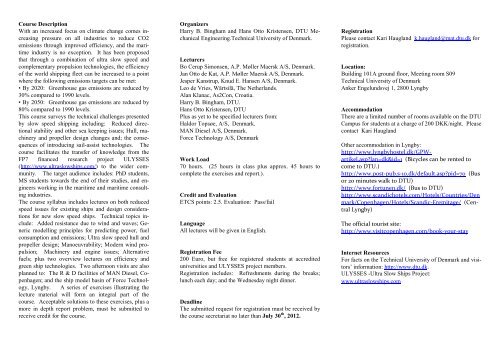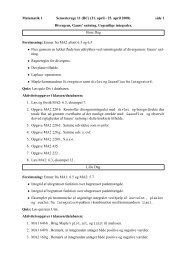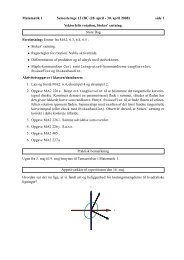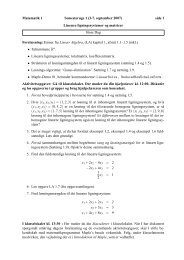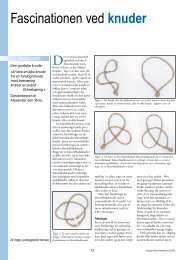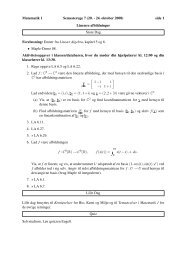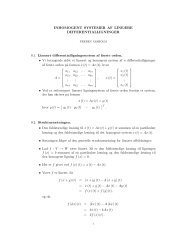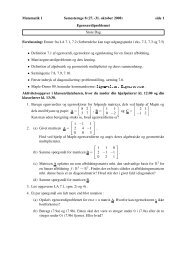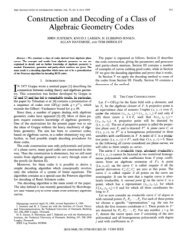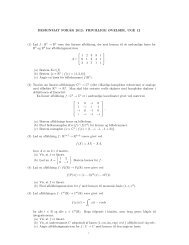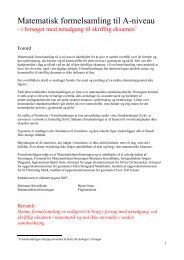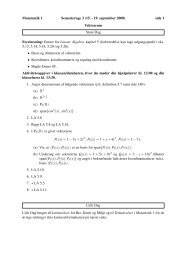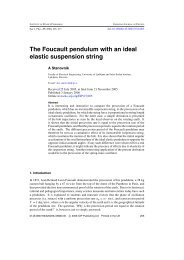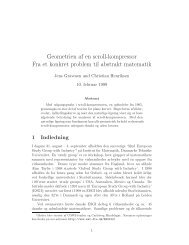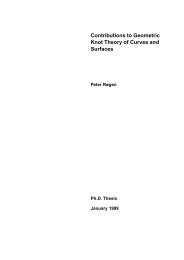Energy Efficient Shipping Through Ultra-Slow Steaming - Technical ...
Energy Efficient Shipping Through Ultra-Slow Steaming - Technical ...
Energy Efficient Shipping Through Ultra-Slow Steaming - Technical ...
Create successful ePaper yourself
Turn your PDF publications into a flip-book with our unique Google optimized e-Paper software.
Course DescriptionWith an increased focus on climate change comes increasingpressure on all industries to reduce CO2emissions through improved efficiency, and the maritimeindustry is no exception. It has been proposedthat through a combination of ultra slow speed andcomplementary propulsion technologies, the efficiencyof the world shipping fleet can be increased to a pointwhere the following emissions targets can be met:• By 2020: Greenhouse gas emissions are reduced by30% compared to 1990 levels.• By 2050: Greenhouse gas emissions are reduced by80% compared to 1990 levels.This course surveys the technical challenges presentedby slow speed shipping including: Reduced directionalstability and other sea keeping issues; Hull, machineryand propeller design changes and; the consequencesof introducing sail-assist technologies. Thecourse facilitates the transfer of knowledge from theFP7 financed research project ULYSSES(http://www.ultraslowships.com/) to the wider community.The target audience includes: PhD students,MS students towards the end of their studies, and engineersworking in the maritime and maritime consultingindustries.The course syllabus includes lectures on both reducedspeed issues for existing ships and design considerationsfor new slow speed ships. <strong>Technical</strong> topics include:Added resistance due to wind and waves; Genericmodelling principles for predicting power, fuelconsumption and emissions; <strong>Ultra</strong> slow speed hull andpropeller design; Manoeuvrability; Modern wind propulsion;Machinery and engine issues; Alternativefuels; plus two overview lectures on efficiency andgreen ship technologies. Two afternoon visits are alsoplanned to: The R & D facilities of MAN Diesel, Copenhagen;and the ship model basin of Force Technology,Lyngby. A series of exercises illustrating thelecture material will form an integral part of thecourse. Acceptable solutions to these exercises, plus amore in depth report problem, must be submitted toreceive credit for the course.OrganizersHarry B. Bingham and Hans Otto Kristensen, DTU MechanicalEngineering.<strong>Technical</strong> University of Denmark.LecturersBo Cerup Simonsen, A.P. Møller Maersk A/S, Denmark.Jan Otto de Kat, A.P. Møller Maersk A/S, Denmark.Jesper Kanstrup, Knud E. Hansen A/S, Denmark.Leo de Vries, Wärtsilä, The Netherlands.Alan Klanac, As2Con, Croatia.Harry B. Bingham, DTU.Hans Otto Kristensen, DTUPlus as yet to be specified lecturers from:Haldor Topsøe, A/S, Denmark.MAN Diesel A/S, Denmark.Force Technology A/S, DenmarkWork Load70 hours. (25 hours in class plus approx. 45 hours tocomplete the exercises and report.).Credit and EvaluationETCS points: 2.5. Evaluation: Pass/failLanguageAll lectures will be given in English.Registration Fee200 Euro, but free for registered students at accrediteduniversities and ULYSSES project members.Registration includes: Refreshments during the breaks;lunch each day; and the Wednesday night dinner.DeadlineThe submitted request for registration must be received bythe course secretariat no later than July 30 th , 2012.RegistrationPlease contact Kari Haugland k.haugland@mat.dtu.dk forregistration.Location:Building 101A ground floor, Meeting room S09<strong>Technical</strong> University of DenmarkAnker Engelundsvej 1, 2800 LyngbyAccommodationThere are a limited number of rooms available on the DTUCampus for students at a charge of 200 DKK/night. Pleasecontact Kari HauglandOther accommodation in Lyngby:http://www.lyngbyhostel.dk/GPWartikel.asp?lan=dk&id=1(Bicycles can be rented tocome to DTU.)http://www.post-pub.s-10.dk/default.asp?pid=70 (Busor 20 minutes walk to DTU)http://www.fortunen.dk/ (Bus to DTU)http://www.scandichotels.com/Hotels/Countries/Denmark/Copenhagen/Hotels/Scandic-Eremitage/ (CentralLyngby)The official tourist site:http://www.visitcopenhagen.com/book-your-stayInternet ResourcesFor facts on the <strong>Technical</strong> University of Denmark and visitors’information: http://www.dtu.dk.ULYSSES -<strong>Ultra</strong> <strong>Slow</strong> Ships Project:www.ultraslowships.com
ScheduleMonday 20 th August09.00 - 10.00 Registration10.00 - 11:00 Keynote presentation by Bo CerupSimonsen, vice president, MaerskMaritime Technology11.00 - 12.00 Lecture on added resistance (wind andwaves) by Harry Bingham, AssociateProfessor, DTU12.00 - 13.30 Lunch13.30 - 14.30 Lecture on propulsion design for slowspeed by Leo de Vries, GeneralManager, Wärtsilä14.30 - 14.45 Break14.45 - 17:00 Exercises on added resistance and propellerdesign by Harry Bingham, DTUand Leo de Vries, WärtsiläTuesday 21 st August09.00 - 09.45 Lecture on generic modeling principlesfor tankers and bulk carriers for predictionof power, fuel oil consumption andexhaust gas emissions by Hans OttoKristensen, senior researcher, DTU09.45 - 10.00 Break10.00 - 10.45 Lecture on ultra-slow speed ship designby Alan Klanac, director, As2Con10.45 - 11.00 Break11.00 - 12.00 Exercise on ultra-slow speed ship designby Alan Klanac, director, As2Con12:00 - 13:30 Lunch13:30 - 14:15 Lecture on maneuverability by a FORCEEngineer14.45 - 17:00 Visit to FORCEWednesday 22 nd August09.00 - 09.45 Lecture on ultra-slow ship design (continued)by an As2Con Engineer09.45 - 10.00 Break10.00 - 10.45 Lecture on machinery issues for slowsteaming by a Maersk Maritime TechnologyEngineer11.00 Departure for MAN Diesel12.00 - 12.45 Lunch at MAN Diesel12.45 - 13.15 Introduction to MAN Diesel R/Dactivities, by a MAN Diesel Engineer13.15 - 13.45 <strong>Slow</strong> steaming issues from MANDiesel's point of view by a MAN DieselEngineer14:15 - 15.15 Visit to MAN Diesel's test enginelaboratory15.15 - 17.00 Visit to Diesel House19.00 Dinner in CopenhagenThursday 23 rd August10.00 - 10.45 Lecture on wind propulsion by JesperKanstrup, Knud E. Hansen A/S10.45 - 11.00 Break11.00 - 11.15 Presentation of the report problem forthose seeking 2.5 ECTS points for thecourse11.15 - 11.45 Methanol as alternative fuel for shippropulsion by a Haldor Topsøe engineer12.00 - 13.30 Lunch13.30 - 14.15 Green ship technologies from a practicalpoint of view by Jan Otto de Kat, seniordirector Maersk Maritime Technology14.15 - 14.30 Closing remarksThe <strong>Technical</strong> University ofDenmarkPh.D.-course<strong>Energy</strong> <strong>Efficient</strong> <strong>Shipping</strong><strong>Through</strong> <strong>Ultra</strong>-<strong>Slow</strong><strong>Steaming</strong>Kgs. Lyngby, DenmarkAugust 20-23, 2012Organized by:Department of Mechanical Engineering<strong>Technical</strong> University of Denmark


